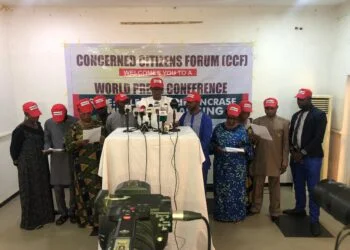Ahead of the commencement of the campaign by political parties, Civil Society Organisations have urged presidential candidates to urgently publish details of their assets and liabilities.
This is as the organisations also called on the Independent National Electoral Commission (INEC) to submit its budget report to the National Assembly for scrutiny.
Addressing a press conference in Abuja on Thursday, the CSOs said the call was necessary to ensure transparency and ensure that the 2023 elections is not heavily monetise.
They include: YIAGA Africa, Socio-Economic Rights and Accountability Project (SERAP), Connected Development (CODE), BudgiT, Accountability Lab Nigeria, Enough is Enough, The Centre for Journalism Innovation and Development (CJID) and Paradigm Leadership Support Initiative.
Executive director, YIAGA Africa, Samson Itodo and executive director, CODE, Hamzat Lawa who spoke on behalf of the groups noted that despite the existence of a legal framework for asset declaration for political office holders, the level of compliance is unknown as data on asset declaration for office holders is not available to the public.
According to them, the lack of public data on the assets of potential political aspirants provides an avenue for opacity and a lack of accountability; thereby fuelling political corruption.
They said: “With over 20 years of sustaining democracy, Nigeria needs to work towards achieving inclusive governance where all classes of citizens and underserved groups have every opportunity to participate in governance processes effectively.
“The monetisation of politics was the main headline during the political parties’ primaries and has become a pointer to how vote buying and selling will play a disruptive role in the 2023 elections. This has also affected the value of the Naira, as aspirants now deal in and distribute major international currencies, especially the dollar. In the last couple of weeks, the dollar to naira exchange rate peaked at N715 on the parallel market due to the undue pressure on the value of the naira.
“Vote buying has become a widespread practice, where democracy has struggled to be fully consolidated due to Nigeria’s entrenched corrupt political class, trapping citizens in self sabotaging, subservient relationships with political leaders. We are therefore calling all political parties and political aspirants to publicly declare their assets.
“They should also declare the utilisation, and retiring of their 2019 campaign funds in compliance with sections 85-90 of the 2022 Nigerian Electoral Act, as a sign of good faith and commitment to publishing same after the 2023 elections”.
The organisations stressed the need for INEC to urgently promote gender
inclusion in electoral processes and in political party leadership through the INEC gender policy, the National Gender Policy, and the PWD Act.
According to them, face of most political party campaigns has shown a regrettable lack of gender-inclusive governance, with political campaigns failing to adequately represent women and persons with disabilities.
The groups called on the National Assembly to oversee full operational independence of the INEC ahead
of the 2023 elections,.noting that the commission should yield to numerous calls for transparency regarding its budget and auditing of its finances.
“The idea behind this is to inform and engage with political parties and potential aspirants on the journey to the 2023 election with a view to strengthening Nigeria’s democracy and making governance work for people through accountable and responsible leadership in the next administration.”
(Courtesy: The Guardian, excluding headline)










